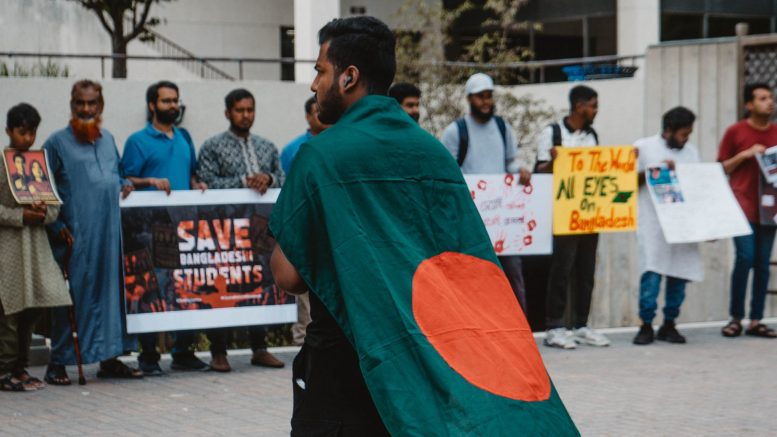A protest ensued at the U of M Fort Garry campus on July 18 following the escalation of violence in Bangladesh. Large-scale protests demanding for quota system reform commenced in Bangladesh on July 1 which escalated to violence on July 15.
Members of the Bangladesh Chhatra League, the student wing of the ruling party, “attacked student protestors […] armed with rods, sticks, and clubs, and with some brandishing firearms,” according to a report from the Office of the High Commissioner for Human Rights (OHCHR).
“These attacks were reportedly not prevented by the police, nor publicly discouraged by the government,” read the report.
The quota system was implemented in Bangladesh following its independence in 1971 and pertains to civil service jobs.
At the time of the U of M campus protest, 30 per cent of civil service jobs in Bangladesh were reserved for children and grandchildren of freedom fighters – those that served in the Bangladesh Liberation War. Additionally, the quota reserved 10 per cent of jobs for women, 10 per cent for underdeveloped districts, five per cent for minorities and one per cent for those with disabilities.
As a result of the quota system, 56 percent of civil service jobs were reserved for various groups. Conversely, 44 per cent of all civil service jobs could be obtained solely on the basis of merit.
Riaj Rahman, a student onsite during the campus protest told the Manitoban that the unemployed residents in Bangladesh “face an unfair quota system.” He added that it is “very unfair to all of those unemployed people and students” and called for reform to restore fairness.
Another student onsite during the protest, Jannat Ferdous, expressed concern to the Manitoban over the lack of contact with family back in Bangladesh. That day, the government imposed a nationwide shut down of broadband and mobile internet, according to the OHCHR. “The server is down,” she stated. “We are not able to talk to any one of our parents – forget parents, our sisters, or anyone in Bangladesh.”
In 2018, similar protests transpired in Bangladesh which called for the termination of the quota system. Following this, the government issued a circular dismissing the quota system, however, the High Court of Bangladesh ruled in June this year that ending the quota system was unconstitutional.
Sudipta Dip described himself as one of the main organizers behind the campus protests and related activities taken by the Bangladeshi community and students. He also serves as the vice-president internal of the University of Manitoban Bangladeshi Students’ Association. Dip stated that a smaller protest occurred the previous day on campus with very short notice. Protests have since occurred at the Mother Language Monument in Kirkbridge Park and the Manitoba Legislative Building. Gayebana janaza, an absentee funeral prayer, was also held for all the students who were killed in Bangladesh.
“We just want the government to simply apologize to the population of Bangladesh that this happened due to their negligence and they could’ve handled it in a better way and 400 students would not have had to die.”
When asked about the difference of opinions amongst Bangladeshi students on campus, Dip said “there are some students among us who have some really strong family background related to the government party and they are frightened to come forward, but they are still giving us support from the back end.”
“We all believe in one thing, that we want justice, and what the government is doing right now is not justice,” said Dip. “The death of 400 students cannot just be cancelled or eliminated by simply reducing the quota that they had earlier. This is not a quota movement anymore after 400 students got murdered.”
UMSU has since made a statement regarding the situation in Bangladesh on their Instagram. “We recognize that this period may be particularly difficult for many of you, and we want to assure you that UMSU is here to provide assistance and resources to help navigate through these uncertain times.”
On July 22, the Supreme Court of Bangladesh reapportioned the quota system, allowing for 93 per cent of merit-based appointments in the civil service. The quota for freedom fighters’ descendants was subsequently scaled down to 5 per cent from 30 per cent.
A report by the OHCHR stated that more than 600 people were killed between July 16 and Aug. 11 due to the recent protests and unrest in Bangladesh. “Those killed include protesters, bystanders, journalists covering the events and a number of members of the security force.”
Sheikh Hasina, then prime minister of Bangladesh, resigned on Aug. 5 after a 20-year rule. Hasina is reported to have since fled the country to neighbouring India.
Footage and interviews from the July 18 campus protest can be accessed here.


